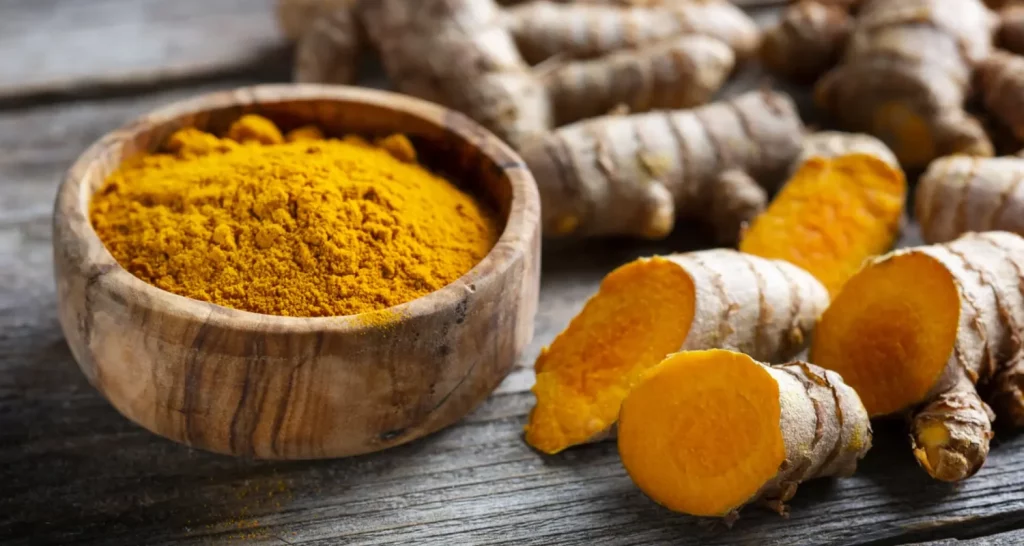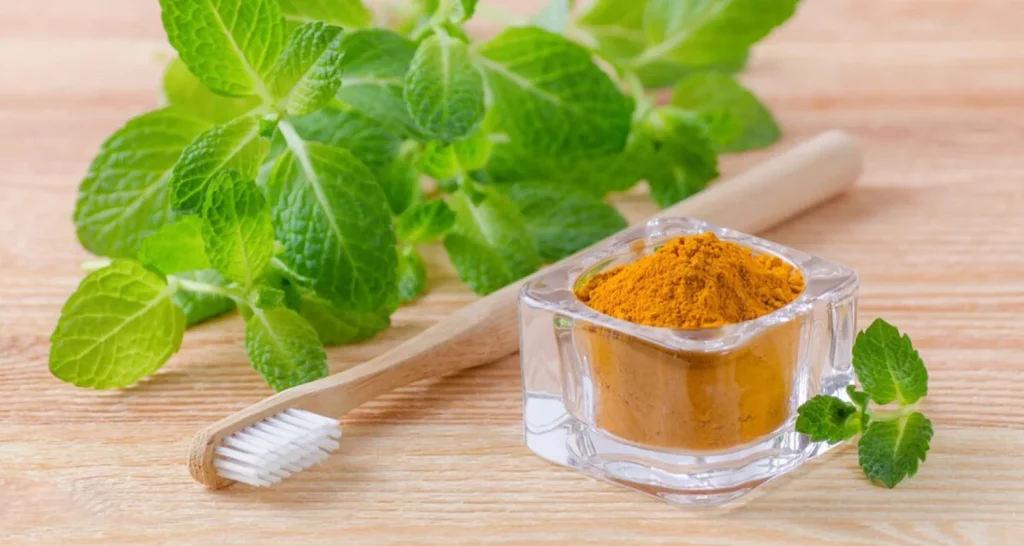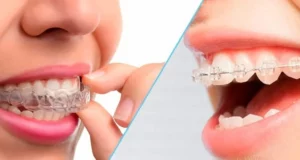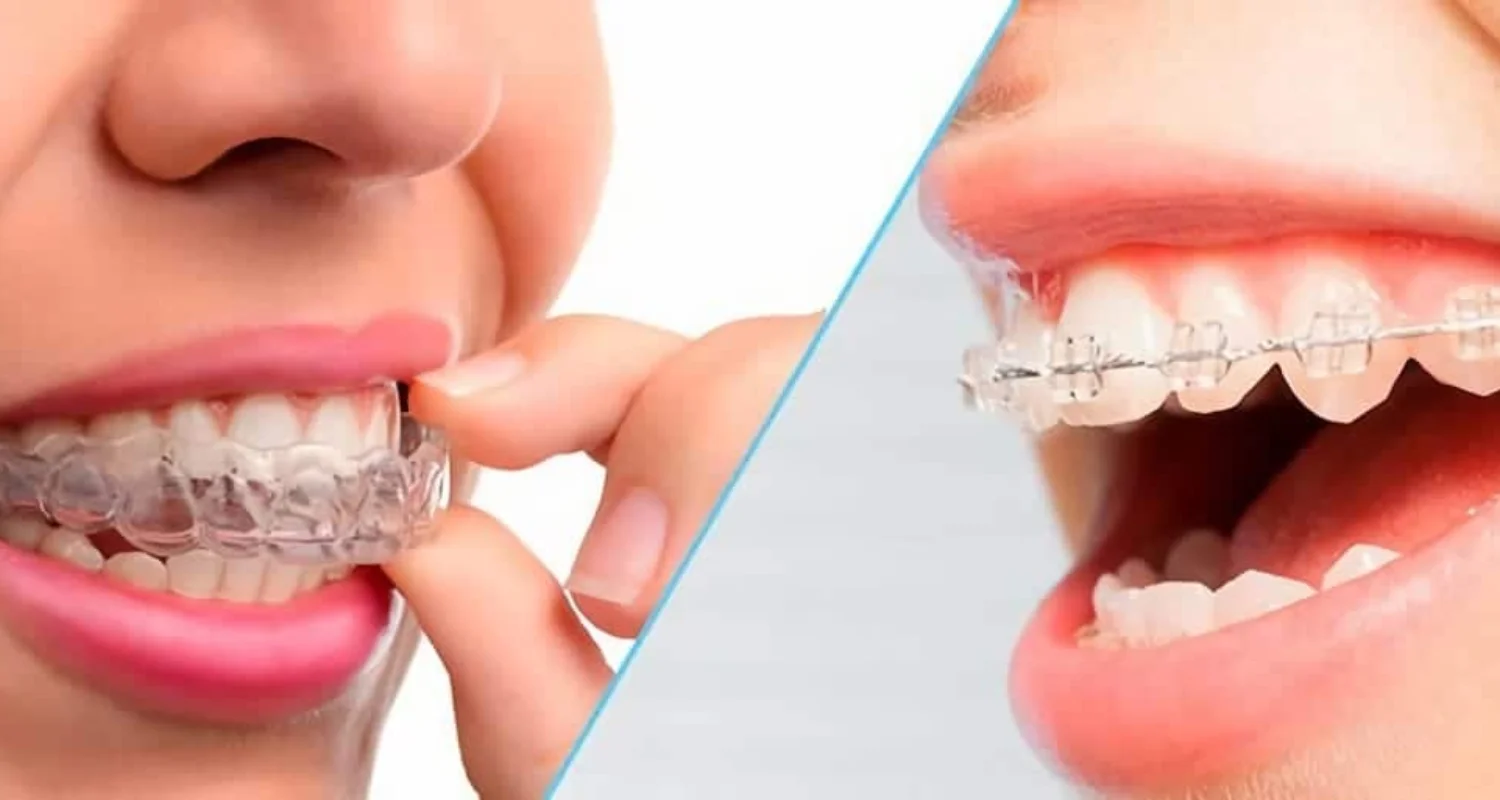Last Updated on: 28th June 2024, 06:50 am
✓ Fact Checked 🕓
❙ Our team of writers, editors, and medical experts rigorously evaluates each article to ensure the information is accurate and exclusively cites reputable sources.
❙ We regularly assess how the content in this article aligns with current scientific literature and expert recommendations in order to provide the most up-to-date research.
The Ultimate Guide to Turmeric for Teeth
Turmeric, a golden spice that has revolutionized cuisines and natural medicine, hides secrets not only for general health but for a healthy smile as well. Its power is not limited to adding color and flavor to our culinary dishes; It also extends to dental care, offering many benefits. In this article, we’ll explore how this wonderful spice can transform your smile.
Introduction to Turmeric and its Dental Benefits

Turmeric, known scientifically as Curcuma longa, has been a mainstay in traditional Asian medicine; in fact, for thousands of years. Recently, it has gained global attention for its anti-inflammatory and antioxidant properties, thanks to the active compound, curcumin. But did you know that turmeric for teeth and gums can be equally miraculous? From its beneficial effects on gums and its contribution to the healing of oral ulcers, turmeric is emerging as a stellar oral hygiene supplement.
How Turmeric Improves Gum Health
Gums are the foundation of a healthy smile, and gum inflammation can be the gateway to numerous dental problems. Turmeric has been found to act as a healing balm for irritated and bleeding gums, based on its antioxidant, anti-inflammatory and antibacterial properties. Turmeric is capable of blocking the production of inflammatory substances such as prostaglandins, regulating the immune response, and inhibiting the growth of multiple pathogenic bacteria that damage the gums.
Turmeric as a Natural Teeth Whitener
In the quest for a dazzling smile, many wonder if turmeric for teeth whitening is effective. The idea has spread that, despite its intense yellow color, turmeric does not permanently stain teeth; on the contrary, it could help whiten them. However, few studies have been carried out in this regard. One was published in the year 2022, aiming to compare the whitening effectiveness of popular natural products for whitening tooth enamel. In the end, the researcher concluded that, although turmeric is one of the natural products that causes the least damage to tooth enamel, it is not effective in whitening teeth. More scientific studies are needed to understand the role of turmeric in teeth whitening.
3 Ways to Incorporate Turmeric into Your Oral Care Routine

Are you wondering how to use turmeric effectively to take care of your oral health? Incorporating this spice into your oral care routine is easier than you think. Here we leave you some ideas:
1. Turmeric-based mouthwash:
A study published in 2011 compared the effectiveness of a turmeric-based rinse with chlorhexidine gluconate, frequently used by dentists to treat gum disease. In this research, The researcher concluded that turmeric-based rinse can be as effective as chlorhexidine rinse in treating gum disease, always accompanied by good brushing and flossing. Below is your guide:
1. Brush your teeth very well.
2. Dissolve 10 mg of turmeric in 100 ml of distilled water.
3. Add half a teaspoon of peppermint oil.
4. Rinse with this solution for 1 minute.
5. Repeat 2 times a day, for 21 days.
2. Turmeric toothpaste
An investigation conducted in 2020, showed that a turmeric-based toothpaste has wonderful effects on gum inflammation. To attain the anti-inflammatory benefits of turmeric, follow these steps:
1. In a small bowl, mix 1 teaspoon turmeric, ½ teaspoon salt, and ½ teaspoon mustard oil.
2. Brush your teeth and gums with this preparation.
3. Rinse.
4. Repeat 2 times a day.
3. Commercial turmeric-based gels:
Currently, some pharmaceutical brands are already manufacturing products with turmeric as the main active ingredient. Turmeric-based gels can greatly contribute to the healing of canker sores and oral ulcers.
Safety and Precautions when Using Turmeric for Dental Health

Consult with a dentist:
Although turmeric is a wonderful natural remedy, it is important to approach it with caution. Before you dive into teeth whitening with turmeric or using it for toothaches, consider consulting a dentist, especially if you have pre-existing oral conditions. Turmeric may interact with certain medications and is not a substitute for professional dental care.
Turmeric does not replace a good oral hygiene protocol:
Incorporating turmeric into your oral care routine could bring major benefits. However, more research is required to find appropriate doses and appropriate forms of use to obtain all its benefits for dental health. Make sure you use it as a complement to your oral hygiene routine, not as a replacement.
Conclusion
● Turmeric is not only a spice that enhances the flavor of our foods, but it has also emerged as a significant ally for dental care.
● Despite limitations in current research, especially in the area of teeth whitening, evidence suggests that turmeric could play a valuable role in promoting healthy oral hygiene.
● As a complement to conventional dental care practices, turmeric offers a natural and gentle approach to maintaining our oral health. However, as with any treatment, it is essential to approach it with knowledge and caution.
Frequently Asked Questions
Is turmeric beneficial for dental health?
Known not only for being a superfood, turmeric also plays an important role in dental care. It is a key component in mouthwashes, whitening solutions, and even oral irrigation techniques to remove plaque. Additionally, it is used as a dental sealant to protect against cavities.
Is turmeric effective for whitening teeth?
Although turmeric is recognized for its benefits on various health problems, there is little evidence that it contributes to teeth whitening. In fact, if any whitening effect is observed after use, it is usually due to the combination with other ingredients, such as baking soda.
Is turmeric abrasive to teeth?
According to researchers, prolonged use of abrasive substances during brushing can reduce the thickness of tooth enamel. Among these, turmeric turned out to be the least abrasive agent, causing the least alteration in the surface texture of enamel. This could be explained by the presence of essential oils in the composition of turmeric.
Can turmeric help receding gums?
Turmeric gel, rich in antioxidant and anti-inflammatory properties, is presented as an effective remedy against gingivitis. As gingivitis is considered one of the triggering factors for gum recession, the use of turmeric gel emerges as an effective strategy to prevent its development.
How can I consume turmeric without staining my teeth?
The origin of dental stains is not limited exclusively to turmeric; It is the acids present in the diet that erode tooth enamel. To minimize stains caused by turmeric, it is recommended to restrict your intake of acidic foods and drinks as much as possible. It is important to remember that the acids that affect tooth enamel not only come from directly acidic sources but also from the metabolic process of bacteria, especially those processes that break down sugars.
Share:
References
1. Chaudhari, A. U., Karhadkar, V. M., Waghmare, P. F., & Jamkhande, A. S. (2011). Comparative Evaluation of turmeric and Chlorhexidine Gluconate Mouthwash in prevention of Plaque Formation and gingivitis: A Clinical and Microbiological Study. The Journal of Contemporary Dental Practice, 12(4), 221–224. https://doi.org/10.5005/jp-journals-10024-1038
2. Forouzanfar, F., Forouzanfar, A., Sathyapalan, T., Orafai, H. M., & Sahebkar, A. (2020). Curcumin for the management of periodontal diseases: A review. Current Pharmaceutical Design, 26(34), 4277–4284. https://doi.org/10.2174/1381612826666200513112607
3. Maciel, C. R. de O., Amorim, A. A., Oliveira, R. F. de L., Vivanco, R. G., & Pires-de-Souza, F. de C. P. (2022). Whitening efficacy of popular natural products on dental enamel. Brazilian Dental Journal, 33(3), 55–66. https://doi.org/10.1590/0103-6440202204863
4. Umapathy, V. R., & Department of Public Health Dentistry, Sree Balaji Dental College and Hospital, Pallikaranai, Chennai 600100, India. (2022). Effects of turmeric (Curcuma longa) on oral health. Bioinformation, 18(6), 538–542. https://doi.org/10.6026/97320630018538
5. Brennan, D. (Nov 27, 2021) What to know about turmeric in dental care. WebMD https://www.webmd.com/oral-health/what-to-know-turmeric-dental-care
6. White, A. (Mar 1, 2018). Turmeric teeth whitening: Coconut oil, results, recipe, and more. Healthline. https://www.healthline.com/health/turmeric-teeth-whitening
7. Waghmare, P. F., Chaudhari, A. U., Karhadkar, V. M., & Jamkhande, A. S. (2011). Comparative evaluation of turmeric and chlorhexidine gluconate mouthwash in prevention of plaque formation and gingivitis: A clinical and microbiological study. J Contemp Dent Pract, 12(4), 221-224.














